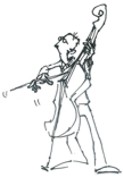Ariel ( piano) with guests: Jean Claude Jones (bass), Jess
Koren (tenor saxophone), Harold Rubin (clarinet), Jerry Garval (drums) Recorded at the Kadima Studio, Jerusalem, May-September 2006.
Recorded and mixed by Ori Winokur.
Cover art by Ariel. Liner notes:
The present collection captures Ariel's playing, improvisation, and composition
in his 9th year, a little over a year after he first discovered jazz
when he acci¬dentally clicked on an Earl Hines link. Until the age
of 7 Ariel's training was entirely classical, but he had been improvising
since he was 4 years old, so he took to jazz naturally.
The album contains mostly Ariel's own compositions and improvisations,
prima¬rily because composition, free improvisation, and avant-garde are
the main attractions of jazz for him. The few standards that appear in
the collection do so in substantially altered states. This collection
is a mixture of Ariel's original compositions in various idioms; free
improvisations for solo piano and duets with sax or clarinet; and his
free interpretation of a few pieces of the standard jazz repertoire.
Whatever the starting point of each piece, they all show Ariel's enthusiasm
for free improvisation and his unique mixing of styles, ideas, and influences.
If you wish to keep up with Ariel's further forays into the world of
jazz and music in general, you can find his site at www.arielpiano.com.
Mixed Feelings (Ariel). This nested piece features a haunting, lyrical
outer shell and proceeds inward with progressively more dissonant parts.
At the core is a highly percussive free section.
Lonely Woman Variations (Ariel). This classic tune is performed by the
trio in a free style, with the bass as the lonely instrument, wandering
around familiar landmarks in restless agitation.
Ornithology (C. Parker). Ariel departs from the usual rhythmic rendering
of this standard and reveals its lyrical quality with long melodic lines
and rubatos à la Chopin in the opening and closing sections. Between
these cantabile book¬ends he inserts a free solo that draws its inspiration
from the likes of Bartok and Matthew Shipp.
Impressions of Manteca (Ariel). Bass four-hands rendition of the legendary
tune, with JC Jones and Ariel tapping on the bass and plucking the strings
simultaneously.
Free Piano Solo (Ariel) Free solo improvisation in the spirit of Jean
Claude Jones's admonition to Ariel: "...and
don't work too hard on preparing improvisa¬tions, get your mind away
from thinking as much as possible whenever you play in a free musical
environment. Never forget this rule. TRÈS TRÈS GROSSE RÈGLE! RÈGLE TRÈS
TRÈS GROSSE! GROSSE RÈGLE TRÈS TRÈS!"
Avant-Duet with Sax (J. Koren & Ariel).
Free improvisation: unplanned, unprepared, unrehearsed.
Avant-Duet with Clarinet (H. Rubin & Ariel).
This unrehearsed free dialog between clarinetist Harold Rubin and Ariel
was performed live at a Kadima salon (hence the different sound). It
is the first time the two, who are separated by three generations, have
played together.
Lizarb (Ariel). Ariel's first tune committed to paper, and the oldest
piece in this collection.
Pilgrimage (Ariel). The determined pilgrim of this tune proceeds at a
rapid clip through the stark, arid landscape strewn with unexpected obstacles.
Lonely Women (O. Coleman et al.). The tune is based largely on Ornette
Cole¬man's Lonely Woman (1959), but it interleaves material from two
other tunes with the same name by Horace Silver (1963) and Benny Carter
(1937), played at times in counterpoint.
Autumn Leaves (J. Kosma). In another nested rendering, Ariel inserts
a free, atonal solo between two lyrical variations on the famous tune,
and wraps it all in the original tune, in a dissonant form at the beginning
and a harmonized one at the end.
31 Bars for Ornette (Ariel). This tune, dedicated to Ornette Coleman,
is loosely based on a Ugandan tune, only a hint of which remains in the
bridge. The free solo climaxes with three crashing clusters that bring
an odd sense of relief and resolution.
A bonus track contains a live performance by Ariel of Copland's scherzo
humoristique The
Cat and the Mouse. This audio track has been taken from
a low-quality video recording.
G.L.
|
|




